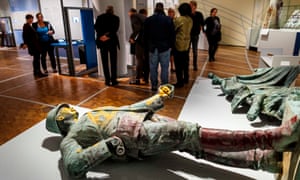
The colonial history of modern Germany was relatively short. Germany itself only came into existence in 1871. Less than half a century later, in 1919, its colonial possessions were stripped from it. By comparison with Britain, France, the Netherlands, Spain and others, Germany’s empire left a relatively small imprint on the history of the globe.
Yet Germany’s colonial history was violent and bloody. It claimed possessions in west, east and southern Africa, as well as the south-west Pacific. These involved sustained plunder and racially driven violence against native peoples. When the Herero and Nama peoples of modern Namibia rebelled against German rule in 1904, for example, they were butchered, forced off their lands, their wells poisoned and the survivors imprisoned in concentration camps where they were often worked to death in squalid conditions.
Why this focus on Germany, readers may be asking? After all, other European colonial powers pursued similar policies over longer periods across more of the globe. The answer is that, unlike them, modern Germany has made a serious institutional effort to debate its colonial past and engage with former colonies on issues including reparations and formal apology. Delicate negotiations between Germany and Namibia about the events of 1904 are set to be completed by June. Meanwhile in Berlin, the German History Museum is currently hosting a special exhibition on Germany’s colonial past.
It is impossible to imagine either thing happening in Britain. As the Cecil Rhodes row a year ago showed, British educational and cultural life struggle to deal with a colonial past whose scale, duration and impact far exceeded that of imperial Germany. The British empire is rarely taught in schools. A museum on the subject in Bristol collapsed amid acrimony in 2012. Public debate rarely gets beyond the clash of jingoism and guilt. Occasional calls for reparations and acts of contrition are met with short shrift, and dismissed as legally invalid. Meanwhile, although Britain has other museums, from the British Museum downwards, with a range of imaginative historical programmes, there is no official museum of British history of the kind that Germany now supports in the heart of Berlin, let alone a national museum dedicated principally to the imperial past.
It is worth reflecting on why an official exhibition in London about British colonialism, similar to the kind that is now running in Berlin about the German equivalent, is so inconceivable. It’s because it is too difficult and painful. Such an event would not be an act of collective national reflection, because that seems beyond us. The passions of supporters and opponents alike would make any kind of consensus approach difficult. It would be a partisan political act. The Daily Mail and Michael Gove would dismiss it as political correctness gone mad.
This predictability is a reminder of three things. The first is that, whether we acknowledge it or not, the colonial past is still with us in Britain today. The second is that Britain has a lazy tradition of taking a rosy view of its own history, in which national crimes play little or no part and from which there is no lesson except British greatness. The third is that modern Britain lacks not just a shared view of history, but a common culture generally, as the clumsy arguments about British values always expose.
Because of its past, modern Germany does not have these luxuries of self-deception and self-glorification. Germany has no alternative but to balance pride about some aspects of its inheritance with the imperative of facing up to others. Until recently, Germany has been so preoccupied with its Nazi past that the colonial era has been ignored. Yet some historians argue that the racial theories and treatment of native peoples connect directly with the mentalities and horrors of the Nazis.
These things are never neat and tidy. The US has one of the most self-glorifying cultures on the planet. But the US also has a better record of publicly debating important aspects of its own history than Britain. Even in the Trump era, Washington DC has outstanding and popular museums on Native American and African American history for which Britain has no equivalent.
Yet Britain needs somehow to learn from what these German and American museums are doing. Over Christmas Theresa May called on Britain to come together after Brexit.That’s a tall order, but part of it would mean seeing ourselves as others see us. Another would involve telling and facing complex and difficult truths about the national past. Right now, we are very bad at both of these things.
[SOURCE:-The Guardian]




